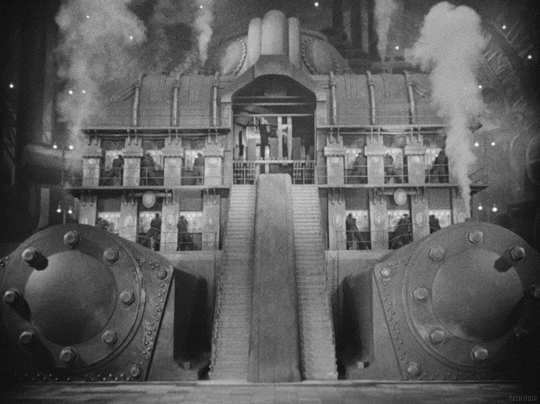Event 1 - Metropolis, April 16th, 12 pm
 |
| The underground factory workers maintaining the Machine |
Indeed, throughout the film, mechanization, robotics, and science overall are fields primarily used as means to evil ends. As previously mentioned, the factory workers live underground and are conditioned to care for this Machine that maintains the power and extravagance of the upper city of Metropolis. Not only do they move in rhythmic fashions, mirroring the rhythm of the machine itself, but the workers’ clothes and appearances are also additionally reminiscent of convicts -- the factory workers are hence prisoners to the Machine.
 |
| Hel, the machine-man, taking on the image of Maria |
Moreover, the only other portrayal of mechanics in this film stems from an inventor named Rotwang. This inventor clearly follows the stereotype of a mad scientist: Rotwang is obsessed with the reviving protagonist's deceased mother, Hel, and creates a machine-man out of her. This machine-man, however, is essentially what sparks the “Apocalypse.” Frederson, the protagonist’s father, tells Rotwang to give the robot the image of Maria, a preacher loved by the workers, and tells the robot to incite disarray and cause distrust in Maria. The machine-man is hence a chaos-inciter whose main purpose is to tear people apart.
Overall, this film is in fact a critique of our not only classist but also industrial society. Created in response to the rapid mechanization of production and automation, Metropolis presents the notion that the industrialization of society is very problematic as it sparks mere abuse and disconnect in man. In fact, one of the only scenes in which the factory workers can be truly described as jovial occurs during the revolution, where the workers destroy and cheer around the burning machine that had caused them so much anguish and despair. Yet, despite this, it is important to recall that this film could only be created due to the intersection of mechanics and man, of robotics and literature. Although Metropolis suggests that it was the robot that was truly evil, I question if, in fact, it was actually man himself that sparked damage and desolation to the city of Metropolis. Indeed, I urge one to consider that in the same way a person can utilize a machine to spark mayhem, they can use it to also spark peace and progress.
| The factory workers, reveling at the destruction of the Machine. |
Lang, Fritz, director. Metropolis. 1927.
"Metropolis (1927)." History of Architecture. 30 Jan. 2011, https://jayjiratt.wordpress.com/2011/01/30/metropolis-1927/
“Metropolis: Themes and Context.” Film Education, Film Education, 2010, www.filmeducation.org/metropolis/pdf/Metropolis_Themes_and_context.pdf.
"Mise En Scene: Metropolis." Media Blog. 18 Jan. 2014, http://kathymediablog.blogspot.com/2014/01/mise-en-scene-metropolis.html
Pfeiffer, Lee. “Metropolis.” Encyclopædia Britannica, Encyclopædia Britannica, Inc., www.britannica.com/topic/Metropolis-film-1927.
Comments
Post a Comment